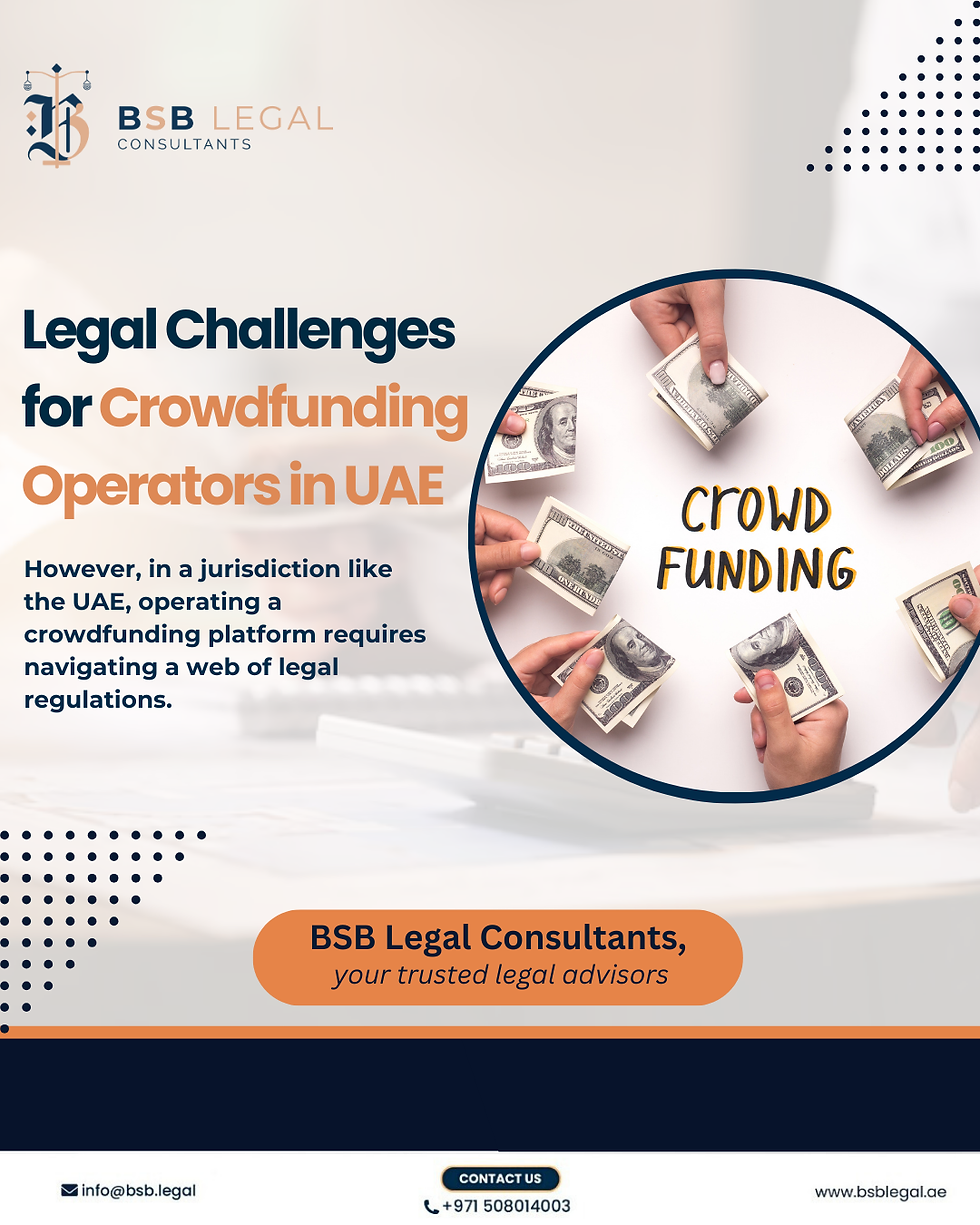Legal Challenges for Crowdfunding Operators in UAE
- BSB Legal Consultants

- May 16, 2025
- 4 min read
What is Crowdfunding?
Crowdfunding is a modern financial method where individuals or businesses raise small amounts of money from a large number of people—usually via online platforms—to fund projects, startups, or social causes. It’s become a popular alternative to traditional finance, especially for startups and entrepreneurs looking to launch new ventures without going through banks or venture capitalists.

But while crowdfunding offers great promise, operating a crowdfunding platform in the UAE comes with unique legal challenges and compliance requirements. Understanding these legal issues is crucial for operators aiming to launch or run crowdfunding platforms in UAE.
Overview of Crowdfunding in Dubai and UAE
Dubai has emerged as a hub for fintech and innovation, and crowdfunding in Dubai has gained momentum over the past few years. The UAE government has recognized the importance of alternative financing and introduced regulations to govern crowdfunding activities.
However, due to its financial and regulatory structure, the UAE has strict rules that crowdfunding operators must follow. These legal frameworks aim to protect investors, ensure transparency, and prevent financial fraud.
Types of Crowdfunding
Before diving into legal aspects, let’s briefly look at the four main types of crowdfunding:
Reward-based Crowdfunding – Contributors receive a reward or product in return.
Equity-based Crowdfunding – Investors get shares in the company.
Donation-based Crowdfunding – No financial return; often for charitable causes.
Debt-based Crowdfunding – Lenders receive repayment with interest.
Each type is subject to different legal scrutiny, especially when financial returns are involved.
Legal Challenges Faced by Crowdfunding Operators in UAE
1. Licensing and Regulatory Approvals
The UAE’s Securities and Commodities Authority (SCA) is the main body that regulates crowdfunding platforms in the country. To legally operate a platform, operators must:
Obtain a license from the SCA.
Comply with specific capital requirements.
Operate only through approved financial free zones (such as ADGM or DIFC) if dealing with investment-based crowdfunding.
Failure to secure proper licensing can lead to legal penalties, fines, or closure of operations.
2. Data Protection and Cybersecurity
Given that crowdfunding operates largely online, data protection is a key legal challenge. UAE laws, including the UAE Personal Data Protection Law (PDPL), mandate:
Securing user data.
Transparent data collection and usage practices.
Data storage in approved locations.
Operators must ensure their platforms are cybersecurity-compliant and that users’ personal and financial data is secure from breaches or misuse.
3. AML and KYC Compliance
To prevent financial crimes like money laundering and fraud, crowdfunding platforms must follow Anti-Money Laundering (AML) and Know Your Customer (KYC) regulations.
This includes:
Verifying the identity of both fundraisers and contributors.
Reporting suspicious transactions.
Regular audits and financial reporting to authorities.
Failure to comply may result in severe penalties and reputational damage.
4. Investor Protection Regulations
The SCA has laid down rules to ensure that small investors are protected:
Platforms must provide clear information on investment risks.
There are limits on how much an individual can invest.
All marketing and communication must be transparent and free from misleading claims.
Operators must maintain detailed disclosures and risk notices to avoid legal challenges related to investor loss or fraud.
5. Cross-border Funding Restrictions
Crowdfunding platforms in UAE must also navigate cross-border restrictions. For example:
Foreign fundraisers or platforms must partner with licensed local entities.
Transferring funds internationally requires compliance with UAE’s Central Bank regulations.
Platforms must avoid promoting international opportunities that have not been approved in the UAE.
These rules are designed to maintain the integrity of the UAE's financial system.
6. Sharia Compliance (For Islamic Crowdfunding)
For platforms aiming to appeal to Islamic investors, Sharia compliance is another layer of legal consideration. Operators must:
Avoid interest-based (riba) transactions.
Ensure investments are made in halal (permissible) ventures.
Get approval from a certified Sharia board.
This adds complexity, especially for equity and debt-based models.
Role of Legal Advisors and Consultants
Given the complexities involved, legal consultants in Dubai play a crucial role in helping crowdfunding operators:
Navigate licensing and compliance requirements.
Draft legally sound terms and conditions.
Ensure investor protection protocols are in place.
Manage disputes or regulatory audits.
Without legal support, crowdfunding operators may inadvertently fall foul of UAE laws, risking fines or platform shutdown.
The Future of Crowdfunding in UAE
Despite legal challenges, the future looks promising. The UAE is working toward creating a more fintech-friendly environment, with initiatives like:
SCA’s Regulatory Sandbox – A safe space for startups to test crowdfunding models.
Improved Licensing Processes – Making it easier for legitimate platforms to enter the market.
Public Awareness Campaigns – Educating both investors and fundraisers on legal and financial best practices.
With the right legal infrastructure and compliance, crowdfunding in Dubai could become a cornerstone of startup funding in the Middle East.
Conclusion
Crowdfunding is a revolutionary way to fund innovation, entrepreneurship, and social causes. However, in a jurisdiction like the UAE, operating a crowdfunding platform requires navigating a web of legal regulations. From licensing to investor protection and cybersecurity, there are many hurdles that operators must clear.
If you're considering launching or investing through crowdfunding platforms in UAE, make sure you understand what is crowdfunding, and more importantly, the laws that govern it. Partnering with experienced legal advisors will ensure your venture remains compliant, protected, and set up for long-term success.



Comments